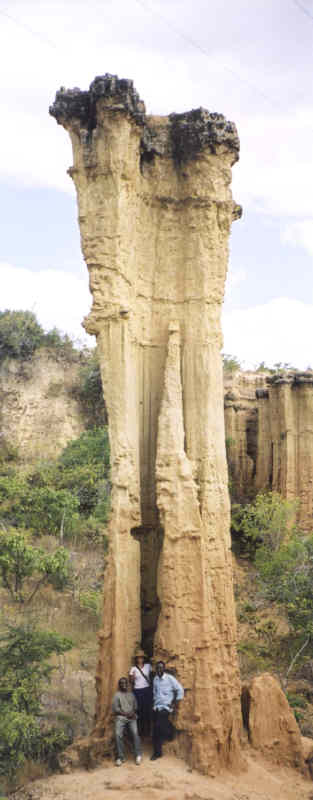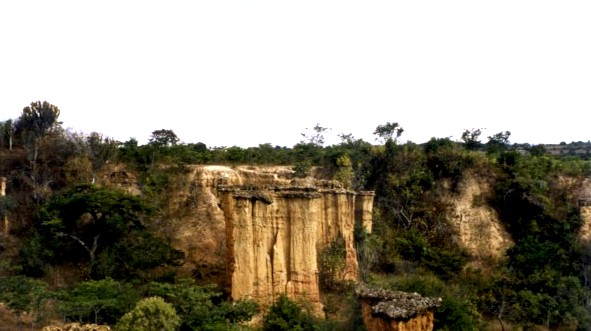
Sunday, June 2 and Monday, June 3
Mang'ula, Tanzania: Twiga Resthouse
Sunday morning, 7:00 am: We
come downstairs to find our guide (Yussuf) and our driver (Mr. Mosha) waiting
for us. We breathe a big sigh of relief. We settle in to the
backseat of the pickup for a long, and sometimes very bumpy, ride. Just a
few hours outside of Dar Es Salaam, the main road passes through Mikumi National Park.
All of a sudden, we see baboons running along on the side of the road. My
first animals in Africa. I go crazy. Really. Screaming and
hanging out the window to take pictures. I
 think
they're adorable running right next to our vehicle, but the guides tell me that
really they're quite aggressive and they steal food from people. That's
when I see the "Please do not feed the baboons" sign on the side of the road.
think
they're adorable running right next to our vehicle, but the guides tell me that
really they're quite aggressive and they steal food from people. That's
when I see the "Please do not feed the baboons" sign on the side of the road.
As if the baboons are not enough, we see impalas, and zebras, and elephants. All of this from the main road. We also saw guinea fowl -- very colorful, silly looking birds -- and marabou storks -- large, ugly, scavenger birds. We stop for lunch at a roadside restaurant outside of Morogoro. We stuck with the safe choices of rice and vegetables or rice and meat, but Yussuf and Mr. Mosha both ordered the Tanzanian national dish: ugali, a porridge made from maize flour. The Tanzanians eat ugali three meals a day and claim that it makes them strong. From what we saw them carrying on their heads, I believe it.
We stop later on for a drink and to watch the World Cup. While neither Randy or I are soccer fans, we find that in the next couple of weeks, we're bitten by World Cup fever, rooting for the African teams along with everyone else. (Plus, we realize that if we don't pay attention to the games, we're not going to have much to talk to people about.)
 After
six or seven hours in the vehicle, we turn off the main road and head for
Udzungwa National Park, one of Tanzania's newest parks, established in 1992,
and billed as a hiker's paradise. With signposts showing the park about 20 kilometers away, I
figure it can't be too much longer. I'm wrong. We finally arrive at
our hotel, right across from the park entrance. Already I miss the Safari
Inn. While our room is adequate, the showers (down the hall) are cold
(very cold) and the toilets are of the squat variety. We learn that half
of the hotel has been renovated, but there was some sort of convention at the
hotel, and all of the renovated rooms were occupied. The manager, however, repeatedly apologized
to us for not being able to give us a better room, and promised us one on our
next visit. We have our first encounter with one of the things that I
loved best about Tanzanian hotels -- shower slippers. In each room, we
would find a pair of flip flops, usually in a very
large size, frequently in two different colors or patterns, and often with a
notch cut out of the top to keep people from stealing them. While not the
most attractive footwear, they are great for avoiding creepy-crawly things
during middle-of-the-night trips to the toilet.
After
six or seven hours in the vehicle, we turn off the main road and head for
Udzungwa National Park, one of Tanzania's newest parks, established in 1992,
and billed as a hiker's paradise. With signposts showing the park about 20 kilometers away, I
figure it can't be too much longer. I'm wrong. We finally arrive at
our hotel, right across from the park entrance. Already I miss the Safari
Inn. While our room is adequate, the showers (down the hall) are cold
(very cold) and the toilets are of the squat variety. We learn that half
of the hotel has been renovated, but there was some sort of convention at the
hotel, and all of the renovated rooms were occupied. The manager, however, repeatedly apologized
to us for not being able to give us a better room, and promised us one on our
next visit. We have our first encounter with one of the things that I
loved best about Tanzanian hotels -- shower slippers. In each room, we
would find a pair of flip flops, usually in a very
large size, frequently in two different colors or patterns, and often with a
notch cut out of the top to keep people from stealing them. While not the
most attractive footwear, they are great for avoiding creepy-crawly things
during middle-of-the-night trips to the toilet.
Swahili Word of the Day: Afya (Literally it means "health" but is used as "cheers," which comes in very handy, and "God bless you.")
 The next morning we get up, eager to do something other than sit in the car.
After breakfast, we set off for the park headquarters and our introduction to
African bureaucracy. We plan to spend one day hiking in the park -- no
camping, no overnight, no fires, nothing but walking -- but we still have
to fill out three different forms, in triplicate, complete with old-fashioned
carbon paper that has to be placed between each of the copies. While
we're not in rush, we wonder what happens to all of this paper.
The next morning we get up, eager to do something other than sit in the car.
After breakfast, we set off for the park headquarters and our introduction to
African bureaucracy. We plan to spend one day hiking in the park -- no
camping, no overnight, no fires, nothing but walking -- but we still have
to fill out three different forms, in triplicate, complete with old-fashioned
carbon paper that has to be placed between each of the copies. While
we're not in rush, we wonder what happens to all of this paper.
The park is known for its resident colobus monkeys -- both the Iringa red colobus, which is endemic, and black and white colobus. We set out with a ranger, and a couple other American guys, one of whom has just finished a stint in the Peace Corps in Madagascar. Yussuf moves very quickly, and within a half hour we're drenched with sweat. But, within short order, we see a load of monkeys in a tree. Although our cameras aren't good enough to get any photos, we can see them pretty clearly through the binoculars.
We spend quite some time studying the monkeys, watching them swing from branch to branch. We're especially fascinated with the babies. After a while, I notice that Yussuf is sitting on the ground looking kind of bored. All of a sudden, I realize that while we're absolutely fascinated by these animals, it must be kind of like watching squirrels to him. I ask him whether this is true, and while not wanting to dampen our enthusiasm, he reluctantly admits that it is.
We continue on to Sange Falls for a cool and refreshing rest, before heading down to Sange village. As we walk through the village, Yussuf points out the wide variety of crops that were grown there. We walk by a small mud house and as we peek in, the woman inside beckons to us to come join her for some food. We defer, not wanting to take what little she had, and continue on. An old man sitting outside another mud house stands when we walk by, greets us, and offers to let us sit in his chair. (I'm assuming this offer was out of politeness and custom, not that we looked so sweaty and tired that he felt sorry for us.) We continue down to the road and met up with Mr. Mosha. While we wait for the other Americans, who we had promised a ride back to the park gate, we have our first encounter with African children. Like most of the children that we'd meet, they are extremely curious, but at the same time quite shy. I take out a small polaroid camera, take a picture of one of the bolder boys, and give it to him. It doesn't take long before most of the kids line up to have their photos taken.
The others finally come down and we head back for well-needed showers (even the cold shower felt good), and a delicious fish dinner at the nearby Udzungwa Mountain View Hotel.
Swahili Words of the Day: ndizi
(banana) and kwa heri (good bye)
Tuesday, June 4
Iringa, Tanzania: Isimila Hotel
Today we leave early, heading for Iringa, the closest town to Ruaha National Park, our next destination. On the way, we stop at the Isimila Stone Age site, which we're told is a significant archeological site. The artifacts themselves are not particularly exciting. The area is known for the abundance of hand-axes, which might be fascinating to archaeologists or anthropologists, but to a lawyer and an electrician, they look a whole lot like rocks. What's nice, though, is that none of the artifacts are in cases or otherwise protected, so we can pick them up and touch them. Behind the stone age site are the pillars, which are fascinating sandstone structures which range up to 80 or 100 feet high.
 |
 |
 |
|
With a lot of time in the car, and not a whole lot to do, today is a big day for learning Swahili. In addition to teaching us to count from one to ten, Yussuf also teaches us some "cool" greetings. Rather than using the traditional greetings, younger people greet each other with "Mambo" (How's it going?) and respond with "Poa" (cool). He also teaches me to respond with "Poa kichaa kama ndizi" which translates to "Cool, crazy like a banana." For the next couple of days, every time we're with other Tanzanians, Yussuf has me put on a little show like a trained monkey. He says "Mambo" and I respond with "Cool, crazy like a banana." The performance always gets a big laugh, but I wonder whether the local people really say this or if Yussuf is just having some fun with me.